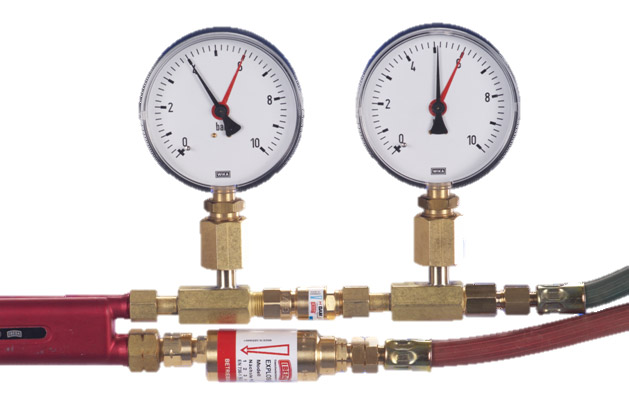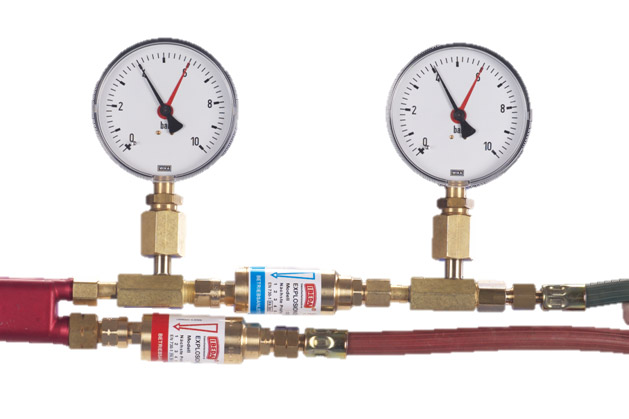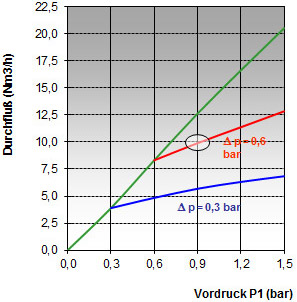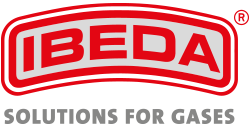Pressure drop by safety devices conforming to EN ISO 5175-1
- Every flashback arrestor clogs up at the sintered element with the passage of time.
- An increase in impurities in the arrestor reduces the flow rate.
- The better the performance of an arrestor, the longer its life.

This multiple-hole burner has high gas consumption. If the flashback arrestor is too small for the application, high pressure drops may occur.
For explanation purposes, a manual heating burner during operation is illustrated. First, the Oxygen side is protected by a torch-mounted flashback arrestor type GG. In the second picture, the Oxygen side is protected by a flashback arrestor type DG91UA.

The same burner, but with different safety devices.
 |
|
| Model | GG |
| Inlet pressure | 5,2 bar |
| Outlet pressure | 4,0 bar |
| A pressure loss of 1,2 bar is visible. | |
 |
|
| Model | DG91UA |
| Inlet pressure | 4,2 bar |
| Outlet pressure | 4,0 bar |
| A pressure loss of only 0,2 bar is visible. | |
|
Inlet pressure |
Outlet pressure (P2) bar |
Airflow in Nm³/h Δp=pv |
Inlet pressure (P2) bar |
Airflow in Nm³/h Δp=0,3 bar |
Outlet pressure (P2) bar |
Airflow in Nm³/h Δp=0,6 bar |
| 0,0 | 0,0 | 0,0 | ||||
| 0,3 | 0,0 | 3,9 | 0,0 | 3,9 | ||
| 0,6 | 0,0 | 8,3 | 0,3 | 4,8 | 0,0 | 8,3 |
| 0,9 | 0,0 | 12,6 | 0,6 | 5,7 | 0,3 | 9,9 |
| 1,2 | 0,0 | 16,6 | 0,9 | 6,3 | 0,6 | 11,4 |
| 1,5 | 0,0 | 20,5 | 1,2 | 6,8 | 0,9 | 12,8 |
Δ = delta = difference, Δp = inlet pressure minus outlet pressure, outlet pressure = inlet pressure minus Δp
Nm³/h = standard cubic meter per hour, bar = pressure measurement
Three curves with different pressure losses are recorded. The higher the difference Δp between the inlet pressure and the outlet pressure, the higher the flow rate (P1 – P2 = Δp).
Example:
In order to achieve the necessary flow rate of approx. 10 Nm³/h with a required working pressure of 0,3 bar, the pressure regulator must be set to 0,9 bar.

The flow curves are mostly measured with air. For other gases there are calculation factors available.
| Gas type | Chemical formula | Conversion factor |
| Air | 1,00 | |
| Acetylene | C2H2 | 1,20 |
| Butane | C4H10 | 0,86 |
| Natural gas | 1,25 | |
| Methane | C2H4 | 1,40 |
| Propane | C3H8 | 0,90 |
| Oxygen | O2 | 0,95 |
| Hydrogen | H2 | 2,50 |
| Ethene | CH4 | 1,02 |
| Industrial gas | 1,55 |
